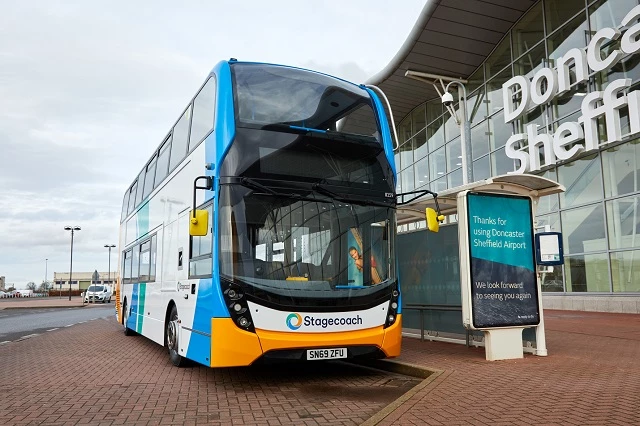
Stagecoach details year of sustainability progress on journey to net zero
Stagecoach has taken some major steps to decarbonising its business and achieving its goal of becoming a net zero business by 2050, with a number of key sustainability improvements for passengers in the Greater Manchester region.
The country’s biggest bus and coach operator has published a new report outlining progress in 2021-2022 against the strategy it launched last year, Driving Net Zero: Better Places to Live and Work, that set out the steps it would take on the journey to become a net zero business.
As part of its sustainability plans, Stagecoach, in partnership with Mayor, Andy Burnham and Transport for Greater Manchester, introduced 32 new double decker electric buses in Manchester in 2020, representing one of the biggest single investments in electric buses in Europe.
Since their introduction, these buses have delivered over 1.75 million carbon free miles and reduced carbon emissions in the region by over 3,250 tonnes to help deliver cleaner air for communities in Greater Manchester.
In addition, Stagecoach Manchester, in partnership with the Department for Transport and Transport for Greater Manchester through the Clean Vehicle Retrofit Approval Scheme, has upgraded 415 buses to the lowest emission engines available and passengers in Greater Manchester are also set to benefit from 30 new low emission double decker buses being introduced in 2023.
The report from Stagecoach details a programme of improvements delivered in 2021-2022 against its Planet, People, Prosperity and Governance targets. It includes a package of capital investment in new cleaner buses, measures to improve energy efficiency as well as improvements and investment for Stagecoach employees and local communities.
Stagecoach ‘Giving for Good’ initiative launched to support charities and community causes, with new partnerships with four national charities and supporting hundreds of local charities.
Stagecoach is continuing with its plans to target a zero emission UK bus fleet by 2035 and has introduced new electric buses across many parts of the country, including one of Europe’s biggest investment in e-buses in Manchester. The company will also be launching the first all-electric city bus networks in the UK in Inverness and Perth in 2023.
Lee Wasnidge, managing director for Stagecoach Manchester, said: “We know there is still a lot of work to be done, but we are pleased to have had a really good year of progress against our sustainability strategy. We’re particularly pleased with the significant carbon savings our electric bus fleet are delivering and are looking forward to the introduction of more new low emission buses in the city next year.
“Despite the challenging macro-economic environment, and the specific pressures that are being faced in the public transport sector, as the country’s biggest bus and coach operator, Stagecoach is continuing to play a leading role in decarbonising the sector and we are working hard towards our target to become a net zero business by 2050.
“Our services are critical to rebuilding the country’s economy and levelling up communities. As well as the steps we are taking to decarbonise our own business, it is equally as important for national and local government and transport operators to work together to maximise the benefits of the bus to meet the country’s aspirations of a net zero future.”
By Mark Adair – Correspondent, Bdaily
- Add me on LinkedIn and Twitter to keep up to date
- And follow Bdaily on Facebook, Twitter and LinkedIn
- Submit press releases to editor@bdaily.co.uk for consideration
Looking to promote your product/service to SME businesses in your region? Find out how Bdaily can help →
Enjoy the read? Get Bdaily delivered.
Sign up to receive our popular morning National email for free.








 Raising the bar to boost North East growth
Raising the bar to boost North East growth
 Navigating the messy middle of business growth
Navigating the messy middle of business growth
 We must make it easier to hire young people
We must make it easier to hire young people
 Why community-based care is key to NHS' future
Why community-based care is key to NHS' future
 Culture, confidence and creativity in the North East
Culture, confidence and creativity in the North East
 Putting in the groundwork to boost skills
Putting in the groundwork to boost skills
 £100,000 milestone drives forward STEM work
£100,000 milestone drives forward STEM work
 Restoring confidence for the economic road ahead
Restoring confidence for the economic road ahead
 Ready to scale? Buy-and-build offers opportunity
Ready to scale? Buy-and-build offers opportunity
 When will our regional economy grow?
When will our regional economy grow?
 Creating a thriving North East construction sector
Creating a thriving North East construction sector
 Why investors are still backing the North East
Why investors are still backing the North East